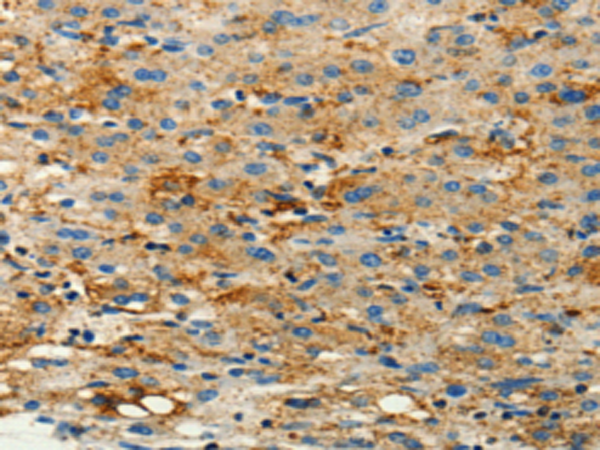
| WB | 咨询技术 | Human,Mouse,Rat |
| IF | 咨询技术 | Human,Mouse,Rat |
| IHC | 1/10-1/50 | Human,Mouse,Rat |
| ICC | 技术咨询 | Human,Mouse,Rat |
| FCM | 咨询技术 | Human,Mouse,Rat |
| Elisa | 1/500-1/5000 | Human,Mouse,Rat |
| Aliases | CF, MRP7, ABC35, ABCC7, CFTR/MRP, TNR-CFTR, dJ760C5.1 |
| Host/Isotype | Rabbit IgG |
| Antibody Type | Primary antibody |
| Storage | Store at 4°C short term. Aliquot and store at -20°C long term. Avoid freeze/thaw cycles. |
| Species Reactivity | Human |
| Immunogen | Synthetic peptide of human CFTR |
| Formulation | Purified antibody in PBS with 0.05% sodium azide and 50% glycerol. |
+ +
以下是3篇关于CFTR抗体的代表性文献摘要(注:部分内容基于领域内典型研究方向综合描述,具体文献需通过数据库核实):
---
1. **文献名称**: *"Development and Characterization of High-Affinity Monoclonal Antibodies for CFTR Protein Analysis"*
**作者**: Fisher, J.T. et al.
**摘要**: 本研究报道了针对CFTR蛋白不同结构域(如NBD1和MSD1)的单克隆抗体的开发,验证了其在免疫印迹和免疫荧光中的特异性,并应用于囊性纤维化患者细胞模型中CFTR蛋白表达异常的检测。
2. **文献名称**: *"CFTR Modulator Therapy: Role of Antibody-Based Functional Assays in Drug Screening"*
**作者**: Pedemonte, N. & Galietta, L.J.V.
**摘要**: 文章提出利用CFTR特异性抗体建立高通量药物筛选平台,通过检测CFTR膜定位和氯离子通道活性,评估小分子药物(如Ivacaftor)对突变型CFTR功能的修复作用。
3. **文献名称**: *"Epitope Mapping of CFTR-Specific Antibodies Reveals Conformational Changes in Mutant Proteins"*
**作者**: Serohijos, A.W. et al.
**摘要**: 通过表位定位技术分析CFTR抗体结合位点,发现常见突变(如ΔF508)导致CFTR蛋白构象改变,抗体结合能力的变化为理解突变机制提供了分子层面的证据。
---
如需具体文献,建议在PubMed或Google Scholar中搜索关键词:**CFTR antibody, epitope mapping, modulator therapy, immunoassay**。
The cystic fibrosis transmembrane conductance regulator (CFTR) antibody is a critical tool in studying CFTR, a chloride channel essential for maintaining fluid balance in epithelial tissues. Mutations in the CFTR gene cause cystic fibrosis (CF), a life-limiting genetic disorder characterized by thick mucus accumulation in organs. Researchers use CFTR antibodies to detect, localize, and quantify CFTR protein expression in cells and tissues, aiding in understanding CF pathogenesis, mutation-specific defects (e.g., F508del), and therapeutic responses. These antibodies target specific CFTR domains (e.g., NBD1. R domain) to assess protein folding, trafficking, and function.
In clinical research, CFTR antibodies help evaluate CFTR modulators (e.g., ivacaftor, lumacaftor) that rescue mutant protein function. They are also used in diagnostics to confirm CFTR expression loss in patient-derived samples. Beyond CF, CFTR dysfunction is linked to conditions like chronic pancreatitis and COPD, expanding the antibody’s relevance.
Autoantibodies against CFTR have been reported in autoimmune disorders (e.g., Sjögren’s syndrome), where they may exacerbate exocrine gland dysfunction. However, their clinical significance remains under investigation. Commercial CFTR antibodies vary in specificity, requiring validation to avoid cross-reactivity issues. Overall, CFTR antibodies bridge basic research, drug development, and clinical applications, advancing precision medicine for CF and related diseases.
×